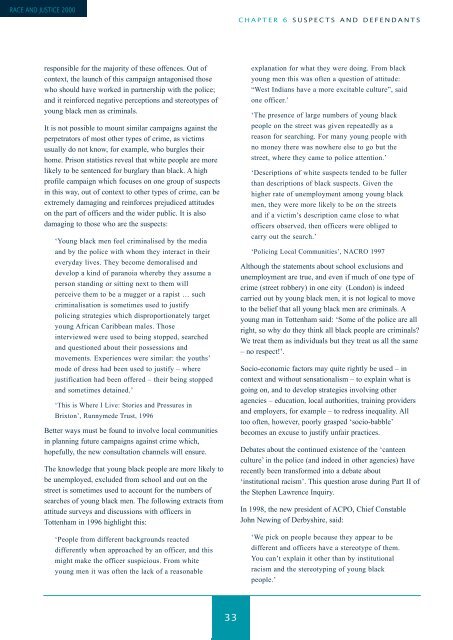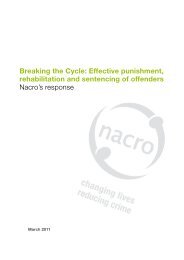Let's get it right: race and justice 2000 - Nacro
Let's get it right: race and justice 2000 - Nacro
Let's get it right: race and justice 2000 - Nacro
- No tags were found...
Create successful ePaper yourself
Turn your PDF publications into a flip-book with our unique Google optimized e-Paper software.
RACE AND JUSTICE <strong>2000</strong>CHAPTER 6 SUSPECTS AND DEFENDANTSresponsible for the major<strong>it</strong>y of these offences. Out ofcontext, the launch of this campaign antagonised thosewho should have worked in partnership w<strong>it</strong>h the police;<strong>and</strong> <strong>it</strong> reinforced negative perceptions <strong>and</strong> stereotypes ofyoung black men as criminals.It is not possible to mount similar campaigns against theperpetrators of most other types of crime, as victimsusually do not know, for example, who burgles theirhome. Prison statistics reveal that wh<strong>it</strong>e people are morelikely to be sentenced for burglary than black. A highprofile campaign which focuses on one group of suspectsin this way, out of context to other types of crime, can beextremely damaging <strong>and</strong> reinforces prejudiced att<strong>it</strong>udeson the part of officers <strong>and</strong> the wider public. It is alsodamaging to those who are the suspects:‘Young black men feel criminalised by the media<strong>and</strong> by the police w<strong>it</strong>h whom they interact in theireveryday lives. They become demoralised <strong>and</strong>develop a kind of paranoia whereby they assume aperson st<strong>and</strong>ing or s<strong>it</strong>ting next to them willperceive them to be a mugger or a rapist … suchcriminalisation is sometimes used to justifypolicing strategies which disproportionately tar<strong>get</strong>young African Caribbean males. Thoseinterviewed were used to being stopped, searched<strong>and</strong> questioned about their possessions <strong>and</strong>movements. Experiences were similar: the youths’mode of dress had been used to justify – wherejustification had been offered – their being stopped<strong>and</strong> sometimes detained.’‘This is Where I Live: Stories <strong>and</strong> Pressures inBrixton’, Runnymede Trust, 1996Better ways must be found to involve local commun<strong>it</strong>iesin planning future campaigns against crime which,hopefully, the new consultation channels will ensure.The knowledge that young black people are more likely tobe unemployed, excluded from school <strong>and</strong> out on thestreet is sometimes used to account for the numbers ofsearches of young black men. The following extracts fromatt<strong>it</strong>ude surveys <strong>and</strong> discussions w<strong>it</strong>h officers inTottenham in 1996 highlight this:‘People from different backgrounds reacteddifferently when approached by an officer, <strong>and</strong> thismight make the officer suspicious. From wh<strong>it</strong>eyoung men <strong>it</strong> was often the lack of a reasonableexplanation for what they were doing. From blackyoung men this was often a question of att<strong>it</strong>ude:“West Indians have a more exc<strong>it</strong>able culture”, saidone officer.’‘The presence of large numbers of young blackpeople on the street was given repeatedly as areason for searching. For many young people w<strong>it</strong>hno money there was nowhere else to go but thestreet, where they came to police attention.’‘Descriptions of wh<strong>it</strong>e suspects tended to be fullerthan descriptions of black suspects. Given thehigher rate of unemployment among young blackmen, they were more likely to be on the streets<strong>and</strong> if a victim’s description came close to whatofficers observed, then officers were obliged tocarry out the search.’‘Policing Local Commun<strong>it</strong>ies’, NACRO 1997Although the statements about school exclusions <strong>and</strong>unemployment are true, <strong>and</strong> even if much of one type ofcrime (street robbery) in one c<strong>it</strong>y (London) is indeedcarried out by young black men, <strong>it</strong> is not logical to moveto the belief that all young black men are criminals. Ayoung man in Tottenham said: ‘Some of the police are all<strong>right</strong>, so why do they think all black people are criminals?We treat them as individuals but they treat us all the same– no respect!’.Socio-economic factors may qu<strong>it</strong>e <strong>right</strong>ly be used – incontext <strong>and</strong> w<strong>it</strong>hout sensationalism – to explain what isgoing on, <strong>and</strong> to develop strategies involving otheragencies – education, local author<strong>it</strong>ies, training providers<strong>and</strong> employers, for example – to redress inequal<strong>it</strong>y. Alltoo often, however, poorly grasped ‘socio-babble’becomes an excuse to justify unfair practices.Debates about the continued existence of the ‘canteenculture’ in the police (<strong>and</strong> indeed in other agencies) haverecently been transformed into a debate about‘inst<strong>it</strong>utional racism’. This question arose during Part II ofthe Stephen Lawrence Inquiry.In 1998, the new president of ACPO, Chief ConstableJohn Newing of Derbyshire, said:‘We pick on people because they appear to bedifferent <strong>and</strong> officers have a stereotype of them.You can’t explain <strong>it</strong> other than by inst<strong>it</strong>utionalracism <strong>and</strong> the stereotyping of young blackpeople.’33

















